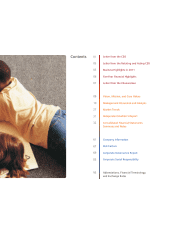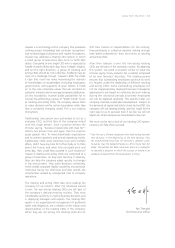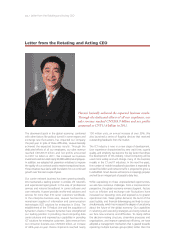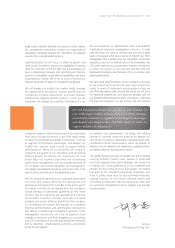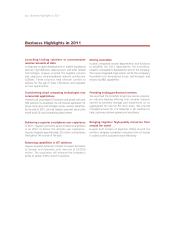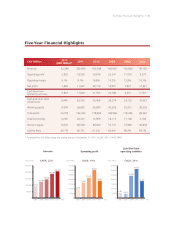Huawei 2011 Annual Report Download - page 7
Download and view the complete annual report
Please find page 7 of the 2011 Huawei annual report below. You can navigate through the pages in the report by either clicking on the pages listed below, or by using the keyword search tool below to find specific information within the annual report.
02
/
Ren Zhengfei
Chief Executive Ofcer
Letter from the CEO
Huawei is a technology-centric company that possesses
nothing except knowledge and customer recognition.
Due to technological dynamics and market uctuations,
Huawei has adopted a rotating CEO system in which
a small group of executives take turns to fulfill CEO
duties. Compared to one single CEO who is expected to
handle multiple affairs each day, have in-depth insights,
and set the right direction, a group of rotating and
acting CEOs should be more effective. Solidarity may be
more of a challenge though. Huawei's BOD has made
it clear that it will not make maximizing the interests
of shareholders or stakeholders (including employees,
governments, and suppliers) its goal. Rather, it holds
on to the core corporate values that are centered on
customer interests and encourage employee dedication.
On this foundation, Huawei builds possibilities for its
survival. By authorizing a group of "bright minds" to act
as rotating and acting CEOs, the company allows them
to make decisions within certain boundaries while they
face a constantly changing world. This is our rotating
CEO system.
Traditionally, one person was authorized to act as a
company CEO, and the fate of the company rested
with this single person. Such a practice echoes the
Chinese saying, "Success or failure rests with Xiao He*."
History has proven time and again that this practice
poses greater risks. To meet shareholder expectations
and to achieve quarterly and annual operating results,
traditionally, CEOs were extremely busy with multiple
affairs, didn't have any time for further study or to think
about the future, and were fully occupied each and
every day. How could they succeed in such situations?
Huawei's rotating and acting CEOs are comprised of a
group of executives. As they seek harmony in diversity,
they can help the company adapt quickly to changes
in the environment. They make decisions collectively,
which avoids corporate rigidity caused by any particular
individual being too obstinate and also avoids the
uncertainties caused by unexpected risks to company
operations.
The rotating and acting CEOs take turns leading the
company for six months. After the rotational period
is over, the non-acting rotating CEOs are still part of
the company's decision-making nucleus. They have
considerable authority in making business decisions and
in deploying managers and experts. The rotating CEO
system is an organizational arrangement of positional
rights and obligations, not a rotation of the mission and
responsibilities of the rotating CEOs in the company.
When they are not acting, the rotating CEOs do not
shift their mission or responsibilities. On the contrary,
they participate in collective decision making and get
even better prepared for their next terms as rotating
and acting CEOs.
After their rotation is over, the non-acting rotating
CEOs are still part of the company nucleus. By adopting
this system, we avoid a situation similar to what the
Chinese saying "Every emperor has a cabinet composed
of his own favorites" describes. This rotating system
ensures that outstanding employees continue to work
for Huawei under the leadership of different rotating
and acting CEOs. Some outstanding employees will
not be inappropriately deployed because managerial
deployments are based on collective decision making
during the rotational periods and these employees
will not be replaced randomly. This practice helps our
company maintain sustainable development. Subject to
the demands of capital and held in check by the BOD, the
company will not develop blindly, and this might be the
right way for us to succeed. Even if we fail, we will not
regret our choice because we have blazed a new trail.
We must not be too critical of our rotating CEO system.
Leniency will help them succeed.
*
Xiao He was a Chinese statesman who lived during the early
Han Dynasty. In the beginning of the Han Dynasty, Xiao
He recommended that Han Xin become a general. Later,
however, Xiao He helped Empress Lü Zhi to have Han Xin
killed. This phrase has been used ever since as a metaphor
to describe a situation in which the success or failure of an
endeavor is derived from the same person or thing.





